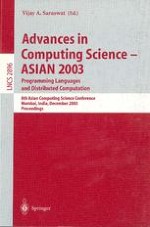2003 | OriginalPaper | Chapter
Paradigm Regained: Abstraction Mechanisms for Access Control
Authors : Mark S. Miller, Jonathan S. Shapiro
Publisher: Springer Berlin Heidelberg
Included in: Professional Book Archive
Activate our intelligent search to find suitable subject content or patents.
Select sections of text to find matching patents with Artificial Intelligence. powered by
Select sections of text to find additional relevant content using AI-assisted search. powered by
Access control systems must be evaluated in part on how well they enable one to distribute the access rights needed for cooperation, while simultaneously limiting the propagation of rights which would create vulnerabilities. Analysis to date implicitly assumes access is controlled only by manipulating a system’s protection state – the arrangement of the access graph. Because of the limitations of this analysis, capability systems have been ”proven” unable to enforce some basic policies: revocation, confinement, and the *-properties (explained in the text).In actual practice, programmers build access abstractions – programs that help control access, extending the kinds of access control that can be expressed. Working in Dennis and van Horn’s original capability model, we show how abstractions were used in actual capability systems to enforce the above policies. These simple, often tractable programs limited the rights of arbitrarily complex, untrusted programs. When analysis includes the possibility of access abstractions, as it must, the original capability model is shown to be stronger than is commonly supposed.
